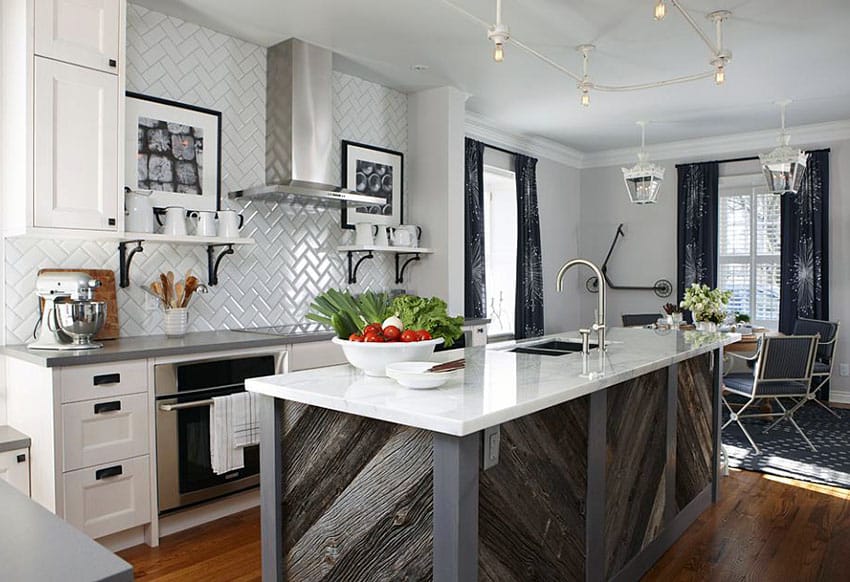Reclaimed Wood Kitchen Islands: Rustic Charm Meets Modern Functionality
The heart of any home, the kitchen, is often where memories are made. And at the center of that culinary hub, a kitchen island reigns supreme. More than just a workspace, a kitchen island is a gathering place, a prep zone, and a statement piece. Choosing the right island can transform your kitchen from functional to fabulous. And if you’re seeking a unique, sustainable, and undeniably stylish option, look no further than a reclaimed wood kitchen island.
The Allure of Reclaimed Wood
Reclaimed wood offers a multitude of advantages that make it a highly desirable material for kitchen islands. Its inherent beauty lies in its history – each piece tells a story, bearing the marks of time, weather, and perhaps even past lives. This unique character adds depth and personality that mass-produced materials simply can’t replicate.
- Unique Character: Knots, cracks, and variations in color add undeniable charm and character, making each island a one-of-a-kind masterpiece.
- Sustainability: By using reclaimed wood, you’re contributing to a more sustainable future. You’re reducing deforestation and giving new life to materials that would otherwise be discarded.
- Durability: Depending on the type of wood and the reclamation process, reclaimed wood can be incredibly durable, lasting for generations.
- Eco-Friendly Choice: Choosing reclaimed wood reduces your carbon footprint, making it an environmentally responsible choice for your home.
- Rustic Appeal: The natural, rustic aesthetic of reclaimed wood complements a variety of design styles, from farmhouse to industrial to modern.
Types of Reclaimed Wood for Kitchen Islands
A variety of reclaimed wood types can be used to create stunning kitchen islands. The choice ultimately depends on your personal preference, budget, and desired aesthetic. Here are some popular options:
- Barn Wood: Known for its weathered look and rich patina, barn wood brings a rustic charm to any kitchen.
- Reclaimed Pallet Wood: A more budget-friendly option, reclaimed pallet wood can be creatively repurposed to create a unique and visually appealing island.
- Reclaimed Timber Beams: These substantial pieces of wood create a striking focal point in the kitchen, adding a touch of grandeur.
- Reclaimed Shiplap: With its classic horizontal lines, reclaimed shiplap offers a clean, yet rustic, aesthetic.
- Reclaimed Flooring: Old hardwood flooring can be repurposed to create a unique and character-filled kitchen island.
Designing Your Reclaimed Wood Kitchen Island
The design possibilities for reclaimed wood kitchen islands are virtually limitless. Consider the following factors when designing yours:
Size and Shape
The size and shape of your island should be determined by the dimensions of your kitchen and your needs. Consider how much space you have available and how you plan to use the island. Popular shapes include rectangular, square, L-shaped, and even circular islands.
Functionality
Will your island primarily serve as a prep space, a dining area, or both? Consider incorporating features such as a sink, cooktop, seating, storage, or a combination thereof.
Style
Reclaimed wood complements a variety of kitchen styles. A rustic farmhouse kitchen might benefit from a heavily distressed island, while a modern kitchen might prefer a sleeker, more refined design with minimal distressing.
Finishing Touches
The finish you choose for your reclaimed wood island will significantly impact its overall appearance and durability. Options range from a natural, oiled finish that highlights the wood’s natural beauty to a painted finish that adds a pop of color or a more contemporary look. Consider sealant options to protect against moisture and wear.
Cost Considerations
The cost of a reclaimed wood kitchen island can vary significantly based on the type of wood, size, design, and level of customization. Expect to pay more for higher-quality reclaimed wood and intricate designs. However, the investment in a high-quality, reclaimed wood island is often seen as a worthwhile one, as it adds value to your home and provides years of enjoyment.
Maintenance and Care
Reclaimed wood requires specific care to maintain its beauty and longevity. Regular dusting and occasional cleaning with a gentle, wood-friendly cleaner are essential. Avoid using harsh chemicals or abrasive cleaners. Depending on the finish, periodic oiling or re-sealing may be necessary to protect the wood from moisture and damage.
Finding a Reclaimed Wood Kitchen Island
You can find reclaimed wood kitchen islands through a variety of sources, including:
- Local artisans and carpenters: Work with a skilled craftsman to design and build a custom island to your exact specifications.
- Online marketplaces: Websites like Etsy and others offer a wide selection of reclaimed wood kitchen islands from various sellers.
- Salvage yards and reclamation companies: These companies specialize in sourcing and selling reclaimed wood, often at competitive prices.
- Antique stores and furniture shops: You might find a unique, one-of-a-kind island at a local antique store or furniture shop.
Conclusion
A reclaimed wood kitchen island is more than just a piece of furniture; it’s a statement piece that adds character, warmth, and sustainability to your kitchen. With its unique beauty, durability, and eco-friendly nature, a reclaimed wood island is an investment that will enhance your kitchen for years to come. Take the time to carefully consider your design preferences, budget, and lifestyle to create a truly bespoke and functional centerpiece for your culinary haven.

